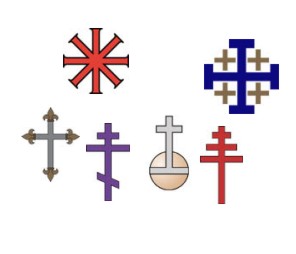| The
legitimate presence of many religious groups in the same place. |
 |
|
A
selection of Crosses used by a variety of Christian groups.
|
European settlement
in North and South America assumed, early on, a religious policy of territorialism.
When this proved difficult to enforce, the related strategy was tolerance,
in which a dominant group permitted certain other groups to exist in its
territory, but these "tolerated" groups often endured various restrictions
and had to pay taxes to support the "official" church. Tolerance
proved impractical in many parts of North America because it was difficult
to enforce. Pluralism therefore developed, sometimes by default and sometimes
on purpose. Leaders such as Roger Williams
and William Penn had suffered persecution
and strove to make religious freedom guaranteed by law. Pluralism
had practical advantages: it was good for trade and it attracted settlers.
Some colonial and state laws experimented with forms of pluralism long
before the constitutional settlement
ensured that the U.S. would have no "established" national church. An
important aspect of religious pluralism in the United States is "denominationalism,"
in which Christian groups mutually acknowledge each other as valid expressions,
or "denominations," of Christianity; all may cooperate or compete as they
choose.
|